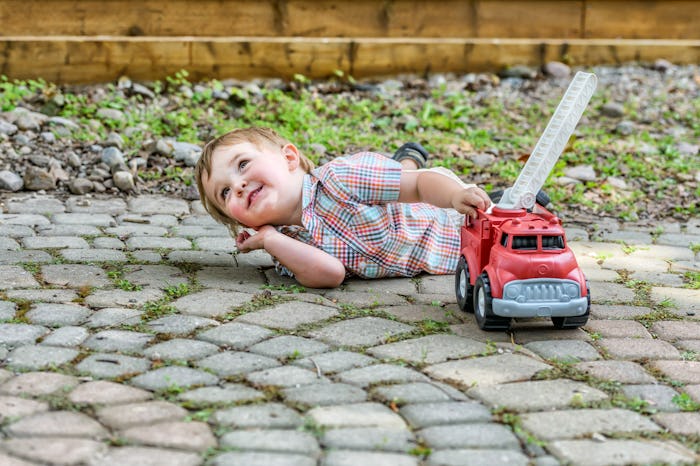Life

How To Handle Your Toddler Laughing When You Discipline, According To An Expert
One thing you learn as a parent is that your children will continuously find ways to test your limits. When they are old enough, you can easily reprimand them by handing them a list of chores, or taking away their prized possessions. But when they are toddlers, it’s much more difficult. Those darned cute faces can get away with anything, especially when they throw adorable smiles your way. So what do you do if your toddler laughs when you discipline them?
It’s important to know what triggers those awkward giggles. Romper asked child psychologist Maureen Healy, author of Growing Happy Kids, who says that toddlers laugh when being disciplined typically because they are nervous. "They have big feelings and are unsure of how to release them," she says.
Healy adds that another reason toddlers may laugh is because they want to save face. "They don't want to feel powerless in a situation and they laugh at your attempt to control them, so correcting unwanted behavior needs to be done with compassion and non-judgement." She suggests that you think of emotionally coaching, not controlling, your child for better results.
Basically? Your toddler isn't disrespecting you, even though it may feel like it. They just have a lot of emotions and a lot to communicate — sometimes they get it wrong.
No matter how your toddler reacts though, you should never lose your cool. According to Baby Center, you should stay consistent and firm when you discipline, but should not resort to yelling or hitting, which could cause further anxiety in your child. The article recommended that you provide a quick explanation of why your toddler’s behavior is wrong, and then redirect them to some other activity.
Positive reinforcement is also key. The more you praise your child when they do something good, the more they are likely to do it. Just keep in mind that by laughing, your toddler isn't truly doing anything wrong. They're just trying to cover how bad they feel. Once you realize that your toddler is just nervous and embarrassed, you can respond in an appropriate and compassionate way.